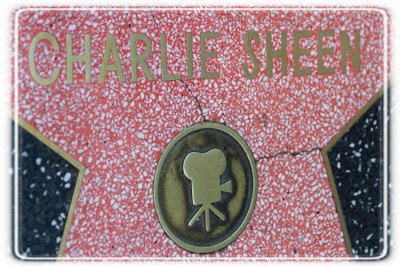
In 2003 CBS aired a show called “Two and Half Men.” The show starred Charlie Sheen, Jon Cryer, and Angus T. Jones. The show was a sitcom about a jubilant free spirited writer and his opposite uptight brother who moves in with him along with is son. The mixture of the worlds collide in the spirit of The Odd Couple that aired from 1970 to 1975. The sitcom, Two and Half Men went on to become a top rated sitcom show with many nominations and awards for their work. However behind the screen, Charlie Sheen’s life was not so funny. His life was characterized by multi-media coverage of his erratic behavior, drug addiction, failed relationships, and chaos that followed him. He cut from the show in 2010.
The world saw Charlie Sheen fall even further from the stars with his behavior despite landing another sitcom. As the years went on rumors began to surface about his health status of being HIV positive. On November 17, 2015 Charlie Sheen revealed that he is HIV positive. Charlie Sheen (Today, 2015) stated, “It’s a hard 3 letter to absorb.” Like many individuals, couples, and families, to be hit with the news that one has a chronic life threatening disease is difficult for anyone to absorb.
HIV History
HIV stands for human immunodeficiency virus. The virus came to the attention of medical professionals in the 1980s. At the time, many individuals were contracting this unknown virus that led to the development of AIDS, acquired immunodeficiency syndrome. HIV is a virus that only attacks the human immune system (T-cells). In other works it strips a person immune system that makes them vulnerable to disease that normally the body would fight and a person would stay healthy. When the immune system is strip by a person’s T cells dropping to 200 or below, only a doctor a diagnosis a person with AIDS. Now, opportunistic infections can enter a person’s body and shorten their life. Since the 80s medical advances have been made were individuals are able to live longer and healthier lives with medications. Despite having these medications that helps people to live longer, the psychological impact is just a great then, in the 80s, as it is now.
Psychological Defense
One of the most famous psychological defense mechanisms that can be found universally is denial. Denial is the cloak of deception that stops us form making an honest inventory of ourselves. The Diagnostic Statistic Manual Fourth Edition – Text Revision (DSM-IV-TR) defines denial as (APA, 2000) “The individual deals with emotional conflict or internal or external stressors by refusing to acknowledge some painful aspects of external reality or subjective experience that would be apparent to others.” To hear that one has a terminal illness this natural defense mechanism/coping style kicks in. The purpose of this mechanism is not to overload the brain with so much trauma at one time After some time, reality begins to seek in and the person will face their fears. Before a person accepts this reality of having a chronic illness one may engaged in another defense mechanism.
Another common defense mechanism is avoidance. Avoidance is when the person is aware that there is a problem however they do not want to address. For example, a medical professional would tell a patient they have a chronic illness and the patient will not address the care he or she needs. Now, the patient is aware however they are just not going to address it. This can be very devastating in the long run, because early intervention is key to a longer healthier life such as Magic Johnson’s. Minks (2015) cited that Charlie’s breakdown that he had around the time he was cut from the show and the media had a field day with erratic behaviors was also around the time Charlie learned of his HIV status. At that time this was Charlie’s way of coping.
Support & Future
A key ingredient to adaptively coping with a chronic illness like HIV/AIDS or any other type of chronic illness is having support (Khakhal, Kapoor, Manju, & Sharma, 2015). There is nothing like having support from one’s family and love ones. These are people that you grew up with, have a connection with, and don’t treat you any differently. However some people do not have the luxury of a biological, blood connection family that is supportive. That doesn’t mean support doesn’t exist because it do. Online forums, HIV/AIDS resources (harc.org) and face to face support groups are available in one’s area. The essence of support comes from a non-judgmental entity that shows care, empathy, and provides encouragement. On the Today show interview with Charlie Sheen, his doctor was present on the show, demonstrating support.
Summary
Being HIV positive is not the end of life. It is the beginning of a new way of life. Those three little letters are very powerful because one knows how impactful the disease can be. Natural defense mechanism will arise and the key is not to get stuck. Realize the reality of one’s life through acceptance. Once acceptance is done, even a little, a healthier life awaits. The support is essential. Tackling an issue like this alone can be very overwhelming and emotionally draining.
References
Khakhal, D.C., Kapoor, B., Manju, & Sharma, K.S. (2015). Three Sides of a Coin in the Life of People Living with HIV (PLWH).
Indian Journal of Community Medicine,40(4), 233-238 6p. doi:10.4103/0970-0218.164385Mink, C. (2015, Nov 16). Meltdown was result of HIV diagnosis – source. Retrieved from http://hollywoodlife.com/2015/11/16/charlie-sheen-meltdown-hiv-diagnosis-two-and-a-half-men/
Today. (2003, Nov 17). Charlie sheen: ‘I’m HIV positive,’ Paid many who threatened to expose me. Retrieved from ttps://www.youtube.com/watch?v=ng5WSbZ9M08.
About the Author

Henry M. Pittman
, MAHenry M. Pittman came into the field of counseling through substance use disorders in the fall of 1997. He was a substance abuse tech at a hospital in Houston, TX and what he saw motivated him to take all the counseling hours needed to become a substance abuse counselor in 1998. Since then he has pursed the required education and knowledge to become a master level counselor and therapist.
Office Location:
7807 Long Point Dr, Ste 215
Houston, Texas
77055
United States
Phone: 800-419-2568
Contact Henry M. Pittman
Professional Website:
www.therapeuticallc.com